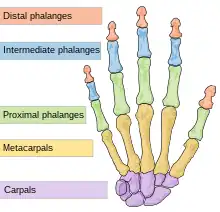phalanx
See also: Phalanx
English
WOTD – 4 December 2015

Bones of the hand: carpals, metacarpals and phalanges
Etymology
Borrowed from Latin phalanx or Ancient Greek φάλαγξ (phálanx, “battle order, array”). Doublet of plank.
Pronunciation
- IPA(key): /ˈfeɪ.ˌlæŋks/, /ˈfæ.ˌlæŋks/
- Hyphenation: pha‧lanx
Audio (US) (file) Audio (AU) (file)
Noun
phalanx (plural phalanxes or phalanges)
- (historical, plural phalanxes) An ancient Greek and Macedonian military unit that consisted of several ranks and files (lines) of soldiers in close array with joined shields and long spears.
- (historical sociology) A Fourierite utopian community; a phalanstery.
- 2009 April 16, Jon Mooallem, “The End Is Near! (Yay!)”, in The New York Times, →ISSN:
- [Charles Fourier] calculated that if precisely 1,620 men, women and children were collected in a 6,000-acre phalanx, they would — all by merrily following their individual passions — end up satisfying all the phalanx’s essential needs.
-
- (plural phalanxes) A large group of people, animals or things, compact or closely massed, or tightly knit and united in common purpose.
- 1827, Lydia Sigourney, Poems, The Chair of the Indian KIng, page 93:
- The monarch hath gone, but his rocky throne
Still rests on its frowning base;
Its motionless guards rise in phalanx lone,
And nought save the winds through their helmets that moan,
And none but those bosoms and hearts of stone
Sigh o'er a fallen race.
- 1886 October – 1887 January, H[enry] Rider Haggard, She: A History of Adventure, London: Longmans, Green, and Co., published 1887, →OCLC:
- But there was no man to greet them in the market-place, and no woman's face appeared at the windows - only a bodiless voice went before them, calling: "Fallen is Imperial Kôr! - fallen! - fallen! fallen!" On, right through the city, marched those gleaming phalanxes, and the rattle of their bony tread echoed through the silent air as they pressed grimly on.
- 1963, J P Donleavy, A Singular Man, published 1963 (USA), page 331:
- Broad phalanx of cars across the bridge moving slowly through the streaming snow.
- 2007 April 25, Hélène Mulholland, “Blair refuses to condemn FoI bill”, in The Guardian, London, archived from the original on 3 October 2014:
- The Guardian today listed a phalanx of ministers who back the bill, including Tessa Jowell, the culture secretary, Tony McNulty, the policing minister, Andy Burnham, the junior health minister, Ian Pearson, the climate change minister, John Healey, the financial secretary to the Treasury, and Keith Hill, parliamentary private secretary to Tony Blair.
- 2007 May 6, Sean O'Hagan, “The day I thought would never come: This week, Ian Paisley and Martin McGuinness will astonish those who experienced the Troubles”, in The Guardian, London, archived from the original on 3 October 2014:
- There, the Paisleyites were being held back by another phalanx of soldiers and policemen.
-
- (anatomy, plural phalanges) One of the bones of the finger or toe.
Synonyms
- (anatomy, bone of the finger or toe): phalange
Translations
ancient Greek military unit
|
finger or toe bone
|
Latin
Alternative forms
- falanx (later form)
Etymology
From Ancient Greek φάλαγξ (phálanx). Compare Latin phalanga.
Pronunciation
- (Classical) IPA(key): /ˈpʰa.lanks/, [ˈpʰäɫ̪äŋks̠]
- (Ecclesiastical) IPA(key): /ˈfa.lanks/, [ˈfäːläŋks]
Declension
Third-declension noun.
| Case | Singular | Plural |
|---|---|---|
| Nominative | phalanx | phalangēs |
| Genitive | phalangis | phalangum |
| Dative | phalangī | phalangibus |
| Accusative | phalangem | phalangēs |
| Ablative | phalange | phalangibus |
| Vocative | phalanx | phalangēs |
Related terms
Descendants
References
- “phalanx”, in Charlton T. Lewis and Charles Short (1879) A Latin Dictionary, Oxford: Clarendon Press
- “phalanx”, in Charlton T. Lewis (1891) An Elementary Latin Dictionary, New York: Harper & Brothers
- phalanx in Gaffiot, Félix (1934) Dictionnaire illustré latin-français, Hachette
- Carl Meißner; Henry William Auden (1894) Latin Phrase-Book, London: Macmillan and Co.
- to form a phalanx: phalangem facere (B. G. 1. 24)
- to break through the phalanx: phalangem perfringere
- to form a phalanx: phalangem facere (B. G. 1. 24)
- “phalanx”, in Harry Thurston Peck, editor (1898) Harper's Dictionary of Classical Antiquities, New York: Harper & Brothers
- “phalanx”, in William Smith et al., editor (1890) A Dictionary of Greek and Roman Antiquities, London: William Wayte. G. E. Marindin
This article is issued from Wiktionary. The text is licensed under Creative Commons - Attribution - Sharealike. Additional terms may apply for the media files.